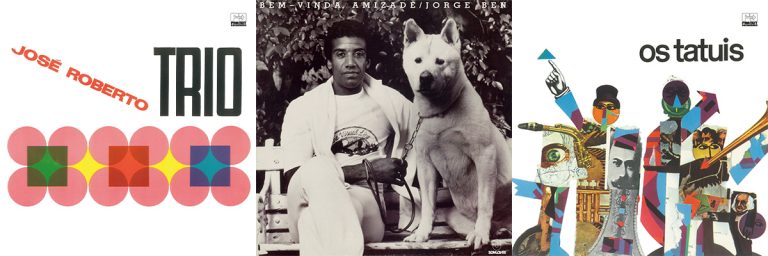
Double Review: José Roberto Bertrami & Jorge Ben
18 March, 2022José Roberto Bertrami – Os Tatuís (1965) / José Roberto Trio (1966)
***
Lest anyone might imagine that Azymuth sprung into the world of Brazilian samba-jazz fully-formed and ready to lay a seemingly endless supply of slickly performed albums on the public, Far Out Recordings unearthed their demo tapes in 2019 to document a band seeking to find, so to speak, its musical feet. Now they’ve gone further back in time to re-release the first two albums of the band’s mercurial keyboard artist and composer-in-chief.
Young Senhor Bertrami came from a highly musical family. His father was a classical violinist and professor at Tatuí’s conservator, the largest music school in Latin America. Three of José Roberto’s siblings became musicians. When he appeared to be losing interest in his private piano lessons, his mother enrolled him at age 13 in the conservatory (as one does). He was still a teenager in 1965 when the first of these records came out: a collection of delicate samba jazz and bossa nova recorded under the name Os Tatuís, a small group with José Roberto on piano, accompanied by organ, horns and a standard rhythm section that included brother Claudio on double bass. It includes a nice version of the Jobim and De Moraes classic, “Insensatez”, with the organ lending it a feel of early Deodato. Among the dozen numbers are interpretations of other songs by Jobim, along with a couple each by Carlos Lyra and Roberto Menescal. “A Bossa do Zé Roberto” is the first self-penned recording by the future prolific composer. He plays confidently and, if you close your eyes and imagine another context, you can just about detect some of the tropes he would go on to employ in the company of Alex Malheiros and “Mamao” Conti.
A year later, he was back in the studio to record a trio album, once more with brother Claudio on bass, and even more clearly in the thrall of that most romantic of jazz pianists, Bill Evans. Once again, there are an even dozen numbers, with interpretations this time of songs by Jobim, Baden Powell, Marcos Valle and Manfredo Fest. The pianist’s three self-penned numbers are arguably the stand-outs of the set, with the funkier “Kebar” benefitting from the addition of hand drums, “Taluhama” featuring tricky twists and changes of pace, and “Lilos Walts” played with the choppier, more staccato thrust of a budding Bud Powell.
Both of these re-releases are clearly the work of an embryonic talent who hasn’t yet found his true mojo. Of the two, the first is probably the more interesting, with the bigger line-up offering greater depth and variety. But both are charming historical documents that highlight the first confident steps towards an illustrious career that would qualify José Roberto Bertrami as a true great of Brazilian popular music.
Os Tatuís / José Roberto Trio is released by Far Out Recordings
Jorge Ben – Bem-Vinda Amizade
****
A little later in the great scheme of Brazilian popular music, disco and funk began to infiltrate the indigenous scene. An indisputable giant in the MPB pantheon, Jorge Ben took such influences in his stride. By 1981, when this album was recorded, this ever-dependable artist – who had not yet added the suffix “Jor” to his surname – had already unleashed “Mas Que Nada” on the world with the help of Sérgio Mendes; recorded “País Tropical” and a host of other golden greats with his regular backing band, Trio Mocotó; fused funk, rock and samba in 1976’s landmark África Brasil; and successfully sued Rod Stewart for the plagiaristic “Da Ya Think I’m Sexy?”.
Re-released by Vampisoul of Madrid, Bem-Vinda Amizade finds the tropical troubadour incorporating disco and boogie into his musical mix, while still managing to sound uniquely and unmistakeably Jorge Ben. “O Dia Que O Sol Declarou O Seu Amor Pela Terra” kicks things off in the kind of infectiously melodic but highly funky, percussive style that characterises the album. It sounds like it was recorded with an entire samba school. “Santa Clara Clareou” is one of his characteristic rousing melodies that can make the hairs on the back of your neck stand on end. It’s not until the third track “Oé Oé (Faz O Carro De Boi Na Estrada)” and the following slow-burning gem, “Era Uma Vez Um Aposentado Marinheiro” (with its guitar motif straight out of the Chic songbook), that you really detect the influence of overseas disco music. The boogie-down element is there again in the exhilarating “Curumin Chama Cunhata Que Eu Vou Contar” (he certainly knew how to elongate his titles!), which kicks off the second side and demonstrates just how powerful Jorge Ben’s vocal performances can be. Even when he slows down the pace, as in the following “Katarina Katarina”, the emotionally-charged “Lorraine” that closes the first side, and the concluding “Luiz Wagner Guitarreiro”, there is still a latent funky power that keeps you on the edge of your seat.
Throughout his time in the limelight, Jorge Ben rarely disappointed. The re-release of this funky gem from the middle of his stellar career is a welcome reminder of just how consistently good he was in his prime. Don’t let the liberal use of the much-maligned label “disco” stop you checking this out. Unlike some albums of the era, it has categorically stood the test of time.
Bem-Vinda Amizade is released by Vampisoul
Follow Sounds and Colours: Facebook / Twitter / Instagram / Mixcloud / Soundcloud / Bandcamp
Subscribe to the Sounds and Colours Newsletter for regular updates, news and competitions bringing the best of Latin American culture direct to your Inbox.

